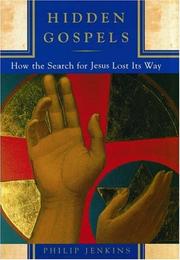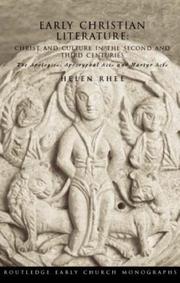| Listing 1 - 10 of 20 | << page >> |
Sort by
|
Book
ISBN: 163087051X 9781630870515 Year: 2013 Publisher: La Vergne Wipf and Stock Publishers
Abstract | Keywords | Export | Availability | Bookmark
 Loading...
Loading...Choose an application
- Reference Manager
- EndNote
- RefWorks (Direct export to RefWorks)
"Who was Papias, who did he know, and what did he believe about the writings that now comprise the canonical New Testament? Very little can be objectively known about him, his ministry, and his work, and yet he demands the attention of any scholar, student, or layperson who desires to understand the origins of the New Testament. This book explores Papias as a source and what he wrote about the origins of certain New Testament books. It also analyzes what other patristic and medieval authors understood about him. Shanks argues that the surviving 'Fragments of Papias' are indeed a valuable resource because they document a very early Christian belief that certain books of the New Testament originated from some of the original followers of Jesus Christ. This evidence cannot be quickly dismissed in proposals about the origins of these books"--Back cover.
Apocryphal books (New Testament) --- Papias, --- Bible. --- Criticism, interpretation, etc.
Book
ISBN: 1306637724 0191017930 Year: 2014 Publisher: Oxford : Oxford University Press,
Abstract | Keywords | Export | Availability | Bookmark
 Loading...
Loading...Choose an application
- Reference Manager
- EndNote
- RefWorks (Direct export to RefWorks)
'Aquinas and Calvin on Romans' is a comparative study of John Calvin's and Thomas Aquinas's commentaries on the first eight chapters of Paul's letter to the Romans. It shows that Calvin's critiques of the 'schoolmen' arising from his reading of Romans fail to find a target in Aquinas's theology.
Justification (Christian theology) --- Apocryphal books (New Testament) --- Biblical teaching. --- Thomas, --- Calvin, Jean, --- Bible. --- Criticism, interpretation, etc.

ISBN: 0199923914 1283427087 9786613427083 0199760705 0197739490 9780199760701 0195135091 9780195156317 9780199923915 9781283427081 661342708X Year: 2001 Publisher: New York : Oxford University Press,
Abstract | Keywords | Export | Availability | Bookmark
 Loading...
Loading...Choose an application
- Reference Manager
- EndNote
- RefWorks (Direct export to RefWorks)
The rediscovery of several lost texts of early Christianity has aroused great public interest and media excitement. This book tells of how these ancient works were rediscovered and how and why people came to make such far-reaching claims about them.
Christianity --- Origin. --- Apocryphal gospels. --- Apocryphal books (New Testament) --- Criticism, interpretation, etc. --- Jesus Christ --- History of doctrines.
Book
ISBN: 1283061392 9786613061393 9004186875 9789004186873 9789004174900 9004174907 Year: 2009 Publisher: Leiden Boston Brill
Abstract | Keywords | Export | Availability | Bookmark
 Loading...
Loading...Choose an application
- Reference Manager
- EndNote
- RefWorks (Direct export to RefWorks)
In the popular imagination Martha has become synonymous with the harried housewife, fretting over excessive preparations. The Martha known to early Christians is far removed from this stereotype. Martha was better known for her role in the story of the raising of Lazarus and as apostle and witness of the resurrection. This book gathers and assesses the early traditions about Martha in text, liturgy and iconography. It shows that the significance of Martha has been seriously underestimated and recovers an important and widespread tradition of Martha as apostle and authority figure for early Christians. The analysis of Martha traditions with attention to issues of gender and authority render this book an important contribution to studies on women in early Christianity.
Women in Christianity --- Apocryphal books (New Testament) --- History --- Criticism, interpretation, etc. --- Martha,

ISBN: 0585107475 9780585107479 0809309580 9780809309580 Year: 1980 Publisher: London Feffer & Simons
Abstract | Keywords | Export | Availability | Bookmark
 Loading...
Loading...Choose an application
- Reference Manager
- EndNote
- RefWorks (Direct export to RefWorks)
Book
Year: 2015 Publisher: Tübingen, Germany : Mohr Siebeck,
Abstract | Keywords | Export | Availability | Bookmark
 Loading...
Loading...Choose an application
- Reference Manager
- EndNote
- RefWorks (Direct export to RefWorks)
This volume collects the contributions of a group of North American scholars who started rethinking, in 2004, the traditional category of New Testament Apocrypha, largely dominated by theological concerns, according to the new perspectives of a greater continuity not only between Second Temple Jewish and early Christian scriptural productions, but also between early Christian and late antique apocryphal literatures. This is the result of the confluence of two, so far, alternative approaches: on the one hand, the deconstruction of the customary categories, inherited from ancient heresiology, of "Jewish Christianity" and "Gnosticism," and on the other hand, the new awareness that the production of new apocryphal texts did not cease at the end of the third century but continued well into late antiquity and beyond. These papers bring together for the first time the typically North American need to reconsider "The Ways That Never Parted" and other artificially drawn "Border Lines" with the more European attention paid to the phenomenon of apocryphicity in the long term. In the twenty essays published here, different facets of this apocryphal continent are newly explored, from the Christian appropriation of Jewish stories and literary genres, with a special emphasis on the case of the late antique Pseudo-Clementines and their hypothetical Jewish Christian source, to the complex and controversial situation of the narrative roles attributed to such figures as Judas Iscariot, Mary of Magdala, Mary the mother of Jesus, or Peter. These new insights are particularly relevant not only for the history of the first Jesus movement but also, and especially, for gaining a better understanding of the ways Judaism and Christianity evolved initially together, then side by side, according to a process of differentiation that took more time than previously thought.
Apocryphal books (New Testament) --- Apocryphal books (Old Testament) --- Criticism, interpretation, etc. --- Criticism, interpretation, etc. --- Jewish Christianity --- Pseudepigrapha --- Gnosticism --- Pseudo-Clementine Literature --- Neues Testament --- Antike Religionsgeschichte --- Antike --- Kirchengeschichte
Multi
ISSN: 00769754 ISBN: 1282400495 9786612400490 9047425030 Year: 2009 Volume: 40 Publisher: Leiden ; Boston : Brill,
Abstract | Keywords | Export | Availability | Bookmark
 Loading...
Loading...Choose an application
- Reference Manager
- EndNote
- RefWorks (Direct export to RefWorks)
Ritual Memory brings together two areas of study which have hitherto rarely been studied in comparison: liturgy and the apocryphal Acts of the Apostles. The book gives an analysis of the liturgical celebration of the apostles in the medieval West and examines the incorporation of the apocrypha in practices of ritual commemoration. It reveals the role that liturgy played in the transmission of the apocryphal Acts and visualises the way these narrative traditions developed and changed through their incorporation into a ritual context. The result is a dynamic picture of the ritual reception of the extra-canonical Acts in the Latin Middle Ages, where the apocryphal legends about the apostolic past were approached as memorable traditions on the origins of Christianity.
Apocryphal Acts of the Apostles --- Apostles. --- Christian saints --- Disciples, Twelve --- Apostolic succession --- Saints --- Canonization --- Acts (Apocryphal books) --- Acts of the Apostles (Apocryphal books) --- Apocryphal books (New Testament) --- History --- Liturgical use --- Cult
Book
ISBN: 0199831289 1283427451 9786613427458 0199830185 9780199830183 0199732108 9780199732104 9780199831289 9781283427456 6613427454 Year: 2011 Publisher: New York (N.Y.) : Oxford university press,
Abstract | Keywords | Export | Availability | Bookmark
 Loading...
Loading...Choose an application
- Reference Manager
- EndNote
- RefWorks (Direct export to RefWorks)
Bart Ehrman, the New York Times bestselling author of Misquoting Jesus and a recognized authority on the early Christian Church, and Zlatko Pleše, a specialist in late ancient philosophy and Gnosticism, here offer a groundbreaking, multilingual edition of the Apocryphal Gospels, one that breathes new life into the non-canonical texts that were once nearly lost to history. For the first time ever, these sacred manuscripts are featured in the original Greek, Latin, and Coptic languages, accompanied by fresh English translations that appear next to the original texts, allowing for easy line-by-line comparison. Also, each translation begins with a thoughtful examination of key historical, literary, and textual issues that places each Gospel in its proper context. The end result is a resource that enables anyone interested in Christianity or the early Church to understand--better than ever before--the deeper meanings of these apocryphal Gospels. In The Apocryphal Gospels, Ehrman and Pleše present a rare compilation of more than forty ancient gospel texts and textual fragments that do not appear in the New Testament. This essential collection contains Gospels describing Jesus's infancy, ministry, Passion, and resurrection, as well as the most controversial manuscript discoveries of modern times, including the most significant Gospel discovered in the twentieth century--the Gospel of Thomas--and the most recently discovered Gospel, the Gospel of Judas Iscariot. The Apocryphal Gospels is much more than an annotated guide to the Gospels. Through its authoritative use of both native text and engaging, accurate translations, it provides an unprecedented look at early Christianity and the New Testament. This is an indispensable volume for any reader interested in church history, antiquity, ancient languages, or the Christian faith. --Book Jacket.
Apocryphal books (New Testament) --- New Testament apocryphal books --- Apocryphal gospels. --- Apocryphal Gospels --- 229*41 --- Gnostic Gospels --- Gospels (Apocryphal books) --- Non-canonical Gospels --- Apocriefe evangeliën van Barnabas, Bartholomaeus, Philippus, Nicodemus, Matias, Jozef de timmerman, van de Ebionieten, de Hebreeën, de Egyptenaren --- Apocryphal Gospels. --- RELIGION --- Biblical Studies --- Bible Study Guides. --- Apocryphes

ISBN: 1134256582 1134256590 1280147342 0203001540 9780203001547 9781134256587 9780415354882 0415354889 9780415354875 0415354870 0415354889 9781134256594 9781280147340 9781134256549 Year: 2005 Publisher: London Routledge
Abstract | Keywords | Export | Availability | Bookmark
 Loading...
Loading...Choose an application
- Reference Manager
- EndNote
- RefWorks (Direct export to RefWorks)
This work concerns the early Christians' self-definitions and self-representations in the context of pagan-Christian conflict, reflected in the literatures from the mid-second to the early third centuries (ca. 150 - 225 CE).
Christianity and literature. --- Christian literature, Early --- Fathers of the church. --- Apocryphal Acts of the Apostles --- Apologetics --- Greek literature --- Bible and literature --- Acts (Apocryphal books) --- Acts of the Apostles (Apocryphal books) --- Apocryphal books (New Testament) --- Church fathers --- Patristics --- Philosophy, Patristic --- Christians --- Literature and Christianity --- Literature --- Christian literature --- History and criticism. --- Criticism and interpretation. --- History --- Relation to the New Testament.
Book

ISBN: 9783110344189 3110344181 9783110348057 9783110383973 9783110348064 3110348063 3110383977 3110348055 Year: 2017 Volume: 175 Publisher: Berlin Boston
Abstract | Keywords | Export | Availability | Bookmark
 Loading...
Loading...Choose an application
- Reference Manager
- EndNote
- RefWorks (Direct export to RefWorks)
Eschewing the search for the hypothetical original, this volume of essays places manuscripts and manuscript culture center stage and provides new readings of texts from various Christian and Jewish traditions in their manuscript contexts. With emphasis on method, the book takes materiality and manuscript practices into consideration, arguing for the significance of realizing the inherent fluidity of textual transmission in a manuscript culture.
091:2 --- 273.1*35 --- 273.1*35 Gnosis: Koptische bronnen: Nag Hammadi Codex Jung Evangelium veritatis --- Gnosis: Koptische bronnen: Nag Hammadi Codex Jung Evangelium veritatis --- 091:2 Handschriftenkunde. Handschriftencatalogi-:-Godsdienst. Theologie --- Handschriftenkunde. Handschriftencatalogi-:-Godsdienst. Theologie --- 273.1*35 Gnosis: Koptische bronnen: Nag Hammadi; Codex Jung; Evangelium veritatis --- Gnosis: Koptische bronnen: Nag Hammadi; Codex Jung; Evangelium veritatis --- Apocryphal books (New Testament) --- Christian literature, Early --- Apocryphal books (Old Testament) --- Jewish literature --- Transmission of texts --- Manuscripts --- Criticism, Textual --- Bible. --- Jews --- Transmission of texts. --- Literary transmission --- Manuscript transmission --- Textual transmission --- Editions --- History. --- Apocrypha --- Criticism, Textual. --- Apocryphal books (New Testament) - Manuscripts --- Christian literature, Early - Manuscripts --- Christian literature, Early - Criticism, Textual --- Apocryphal books (Old Testament) - Manuscripts --- Jewish literature - Manuscripts --- Jewish literature - Criticism, Textual --- Transmission des textes --- Littérature chrétienne primitive. --- Manuscrits. --- Manuscrits hébreux. --- Méthodologie. --- New Philology. --- exegesis. --- manuscript culture. --- textual fluidity.
| Listing 1 - 10 of 20 | << page >> |
Sort by
|

 Search
Search Feedback
Feedback About UniCat
About UniCat  Help
Help News
News